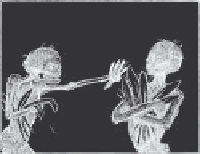Graphics Reference
In-Depth Information
How are you with fi lm grammar, or do you just like to concentrate on the
shot you are doing? Do you read the whole script?
JD
- Read the script? Depends on the project. Sometimes I have been involved in making signifi cant
changes to the script, as with
Caveman
, where I added a sequence in which a giant lizard attempts to eat
Ringo Starr, just as Ringo is attempting to eat a small lizard.
Film grammar is my specialty. Again in
Caveman
, I had to fl op some of the storyboards to maintain fi lmic
continuity. In other cases I had Randy Cook white out and redraw portions of the boards in order to make
them fi lmable. For
When Dines Rule
, I did most of the storyboards, and therefore had much control of the
fi lmic 'grammar', but even so, there were times when the director decided to make a change from my
boards, always with unfortunate consequences.
TB
- I have always been fascinated by fi lm theory and grammar, and I teach it at the college level.
I teach fi lm fundamentals in all of my animation classes, because most students don't know the fi rst thing
about fi lm theory and how to put shots together. All they know is what they've garnered in video fi ghting
games, which is hardly fi lm or storytelling; although for the past few years, many games are beginning to
offer attract modes that are cinematic in quality. However, students, have not studied how shots are put
together, and they don't know the fi rst thing about editing and composition (montage and mise-
en-scène), so I'll show them examples from not only animation fi lms, but live-action fi lms as well.
RC
- Well, I would say I would want to read as much of the script as would be necessary to do my job
well. If there are relevant sections, then yes, absolutely.
DC
- I like to know what's going on and why and would like to direct something sometime somewhere
somehow (I've only directed two episodes of
Morph
so far), so I feel my attention to fi lm grammar is
improving with my inquisitive interest
AW
- I always try to see the big picture. The story, and the shots before and after are very important to
me, and I do read the script.
SB
- I look at the whole script so that I understand how everything relates and how the scene fi ts in.
RH
- If there is time I try to read the whole script, particularly concentrating on my scene. It's always
important to consider the whole shape of things in the story, and not just the shot itself.
JC
- It can be helpful if you have a sense of fi lm grammar, you can pick up on things that are not
right before they get to the edit room. It's essential to have a good knowledge of the whole script. It's
important to know where a scene lies within the story and where the shot lies within that scene. I feel
continuity is as much my responsibility as the director's.
Acting
An animator is often compared to an actor, but actors have the luxury of several
weeks to rehearse a play, playing with the character, the movement, letting
things develop and grow. We have to be pitch perfect on the i rst take, as that's
all we get. To some extent we cannot grow, as the more recent rushes would sit



Search WWH ::

Custom Search